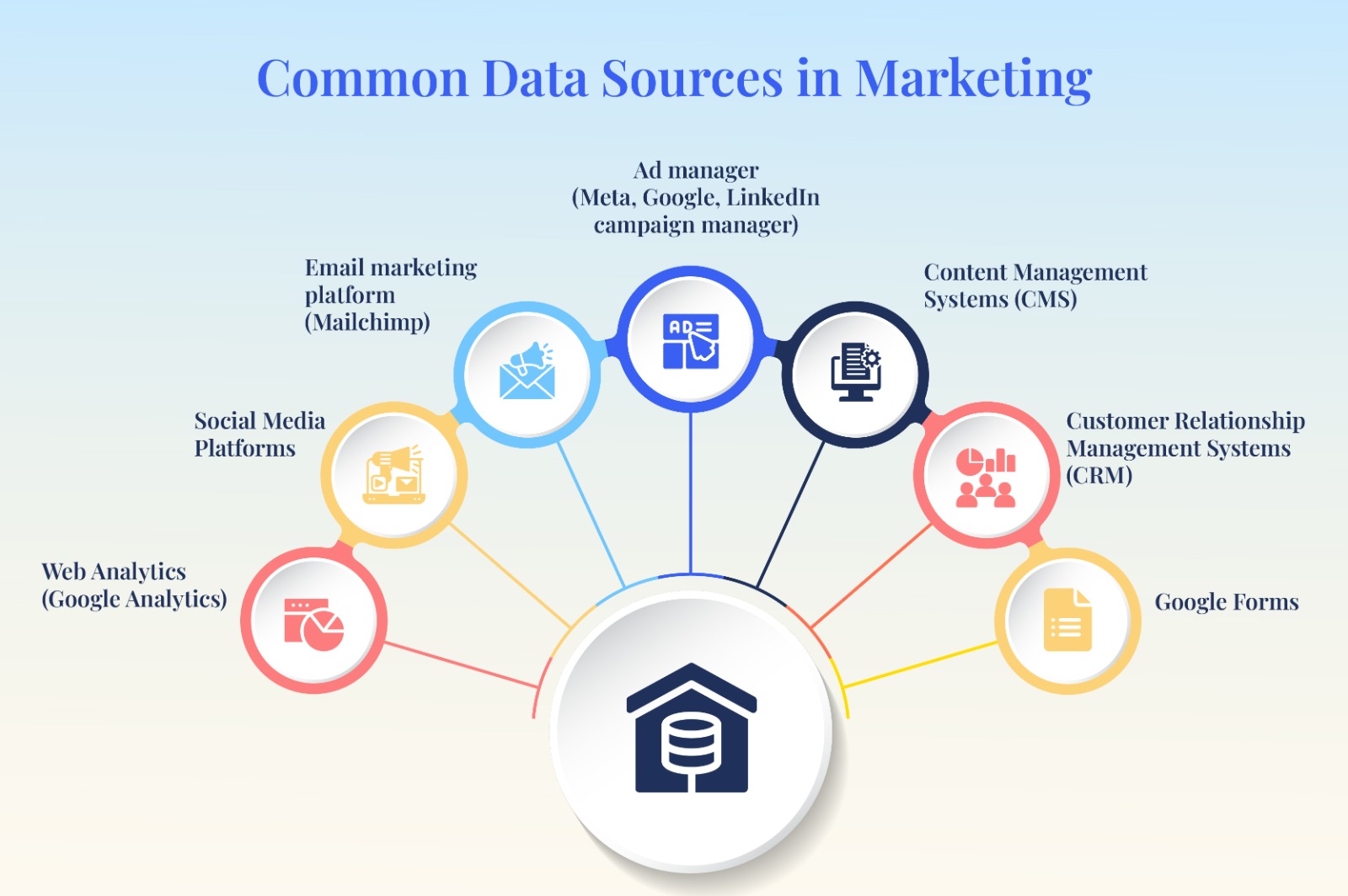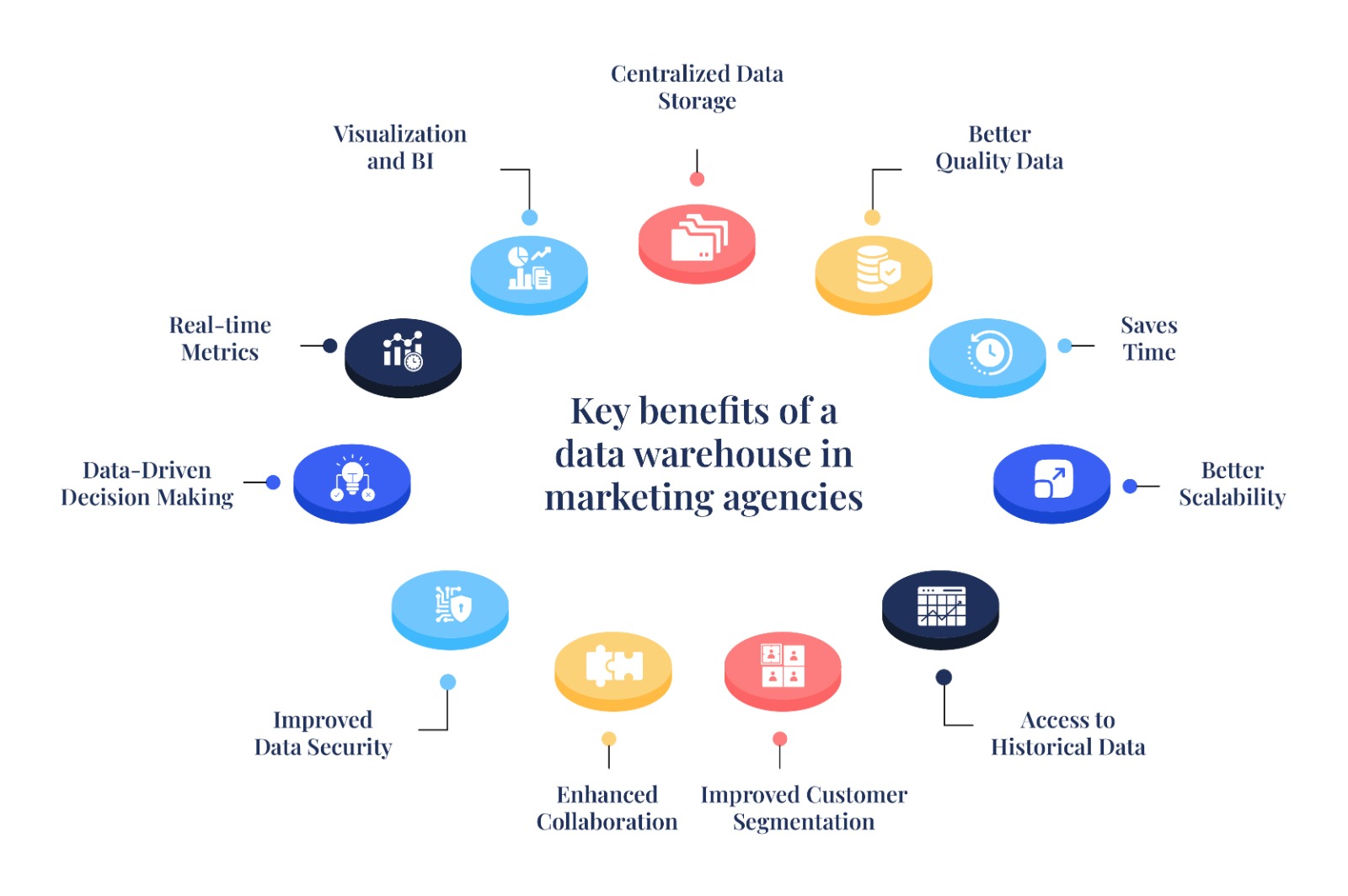Why does every Marketing Agency need a Data Warehouse?

Table of Contents:
Introduction
Marketing strategies today hinge on a data-centric approach. But do marketers make wise use of all the available data? Most digital marketing agencies spend hours getting and cleaning data since their data is stored in silos across a bunch of different platforms. According to a survey, marketers use around 15 different data sources on average. No wonder it is difficult for marketers to organize and get the most use of the data.
This is where a data warehouse comes into play, transforming how agencies manage, analyze, and leverage their data for strategic advantage. Here’s why a data warehouse is no longer just a luxury but a necessity for a marketing agency.
Understanding data warehouse in marketing:

A data warehouse serves as a centralized data storage for agencies where data is consolidated from various platforms. This enables marketers to gain quality insights and make data-driven decisions.
Common Data Sources in Marketing:
In the digital age, marketing agencies are saturated with humongous amounts of data. This data is present in the form of multiple sources, such as:
- Web Analytics (Google Analytics) – Metrics such as website traffic statistics, user behavior, conversion and bounce rates, demographic information of website users
- Social Media Platforms: Social media metrics include engagement (likes, shares, comments), follower demographics, post reach, and ad performance metrics.
- Email marketing platform (Mailchimp) – Email marketing metrics include open rates, click-through rates, bounce rates, subscriber lists, and conversion data from email campaigns.
- Ad manager (Meta, Google, LinkedIn campaign manager) -Ad metrics such as impressions, clicks, conversions, ad spend, and ROI.
- Content Management Systems (CMS): CMS data include content performance metrics (page views, time on page), SEO analytics, and user engagement data.
- Customer Relationship Management Systems (CRM): CRM data includes customer profiles, interaction history, sales pipeline data, and communication records.
- Google Forms – Data in Forms are mostly survey responses, customer feedback, and insights into preferences and satisfaction levels.
Besides this, there is data on sales, customer purchasing patterns, customer transaction history, market trends, competitive analysis, client feedback, third-party data, and in-app behavior.
Seems overwhelming at first glance?
Now imagine the volume of data being fed into each one—this is precisely why a marketing agency needs a data warehouse.
Why Data Warehouses Matter for Marketing Agency:

- Centralized Data Storage for Agencies: A data warehouse consolidates disparate data into a single source of truth, enabling marketing teams to access comprehensive insights without the hassle of juggling multiple systems.
- Better Quality Data: By standardizing data, warehouses ensure consistency and accuracy. This reduces the errors, minimizes discrepancies, and enhances the overall data quality. For example, a data warehouse can clean and standardize marketing and sales data so that a lead is recognized consistently across the system.
- Saves Time: The centralization of good quality data from various sources allows marketers to access data in a matter of clicks rather than spending hours sifting through each system. For example, when preparing a campaign report, instead of manually pulling data from each individual platform, marketers can generate a holistic report directly from the data warehouse.
- Better Scalability: As your business grows, so does your data. Data warehouses are created in a way that data can be scaled without sacrificing performance.
- Access to Historical Data: Agencies can track historical data over time, enabling better marketing campaign performance analysis.Access to historical data through data warehousing provides several advantages for marketers, such as:
- Trend analysis
- Performance tracking
- Customer journey mapping
- Seasonal insights
- Competitive analysis
- Risk mitigation
- Customer retention strategies
- Better reporting
- Improved Customer Segmentation: All data at one source means marketers can have a holistic view of their target customers in a single dashboard. This can help them understand and target the right audience, tailored campaigns, and timely engagement.
- Enhanced Collaboration: Marketing thrives on collaboration. Centralized data fosters better collaboration among teams, as everyone has access to the same insights and marketing analytics solutions.
- Improved Data Security: Data warehouses implement strict access controls(role-based access control) to ensure that only authorized personnel can view or manipulate data. This ensures that the customer’s sensitive information doesn’t fall into the wrong hands and reduces the risk of data breaches.
- Data-Driven Decision Making: Data warehouses lead to better availability of high-quality data. Marketing data insights from high-quality data can allow marketers to set benchmarks for success, measuring performance against industry standards or past campaigns. This helps identify areas for improvement in your data-driven marketing strategies.Data centralization helps to set standards across the organization for analyzing data and evaluating performance.
- Real-time Metrics: Modern data warehouse solutions are much more than just marketing data consolidation. They can ingest data almost instantly. This capability supports timely decision-making and responsiveness to market dynamics. Real-time metrics also allow marketers to make real-time adjustments to campaigns and personalized marketing efforts based on current trends. Marketers can also conduct better A/B tests and analyze results in real time.
- Visualization and BI: Visualization and Business intelligence tools for marketing can connect directly to a data warehouse, enabling users to access comprehensive datasets without needing to search multiple systems. This ensures easier transformation of all the available raw data into actionable insights.
Marketing automation and data warehouse:
For modern marketing strategies, it is essential to integrate marketing automation with data warehousing. Real-time insights from the data warehouse empower marketing automation tools to trigger timely actions, optimize lead nurturing, and enhance attribution tracking.
The synergy between marketing automation and data warehouse solution not only improves campaign effectiveness but also fosters deeper customer engagement, ultimately driving better business outcomes.
Conclusion:
A data warehouse is indispensable for marketing seeking the best out of their data, especially as the marketing landscape evolves. As a digital marketing analytics firm based in New York, we highly recommend data warehouses for marketers not just to collect data but to capitalize on it with smarter marketing.
For marketing agencies based in the USA, Are you ready to make your data work smarter, not harder?Connect with Quilytics – your marketing analytics consultants today.
FAQs:
How to create a data warehouse?
To create a data warehouse, first define your objectives and gather requirements, then choose an architecture and ETL tools for data extraction, transformation, and loading. Finally, implement the infrastructure, load the data, and develop reporting tools to analyze and visualize the information effectively.
Is SQL a data warehouse?
No, SQL (Structured Query Language) is not a data warehouse. SQL is a tool (language to manipulate data), and a data warehouse is a storage solution.
Who uses a data warehouse?
A data warehouse can be used by anyone who relies on data to get insights. Stakeholders such as business analyst, data scientist, marketing team, management and IT team can make the most use of data warehouses.
What is a data warehouse with a simple example?
A data warehouse is a centralized storage system that consolidates data from various sources. For example, a retail company can combine online sales, in-store transactions, and customer feedback in a data warehouse.
